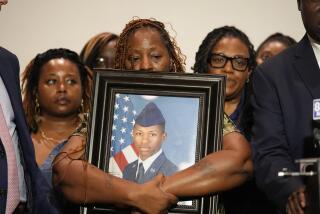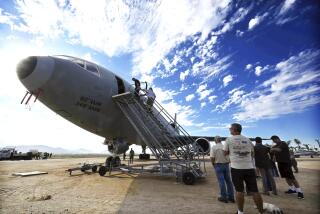Man Dies in Airline Threat
- Share via
MIAMI — An agitated passenger who boarded an Orlando-bound airliner and claimed to have a bomb in his backpack was shot and killed Wednesday by federal air marshals, authorities said.
Two marshals on board the plane at Miami International Airport confronted Rigoberto Alpizar, 44, who tried to escape by running to the jetway. The marshals went after him, but he refused to obey their orders to get down on the ground and was shot when he tried to reach into his backpack, authorities said.
Officers detonated the backpack, which contained no explosives. James E. Bauer, special agent in charge of the Federal Air Marshal Service’s Miami field office, would not say how many shots were fired or whether Alpizar, a U.S. citizen, was shot while on the plane or in the passageway.
According to a witness who was seated in the third row of the coach section, four to five gunshots rang out, terrifying passengers on the American Airlines Boeing 757.
Mary Gardner told a Miami television station that a woman who was traveling with Alpizar screamed: “My husband, my husband!” Gardner said the woman also said that he suffered from bipolar disorder and hadn’t taken his medication.
After the gunfire, Gardner said, police boarded the jetliner and told everyone to put their hands on their heads.
“It was quite scary,” Gardner said. “They wouldn’t let you move. They wouldn’t let you take anything out of your bag.”
The passengers were later escorted off the plane and onto a bus. Authorities spread their bags out on the tarmac and had dogs sniff them for explosives. Bomb squad members blew up at least two bags.
It was the first time since security was tightened after the Sept. 11 terrorist hijackings that air marshals had fired their firearms, said other marshals who spoke on condition of anonymity because they are not allowed to talk to the media.
Before the 2001 attacks, there were 33 air marshals. Because anonymity is key to its mission, the Federal Air Marshal Service does not release its personnel numbers, but it is estimated to have 2,000 agents.
Bauer said an investigation of Wednesday’s shooting was underway, but that the regulation dictating when marshals can use their weapons was “the same for any law enforcement officer: when there’s a threat -- a life threat.”
“Anytime somebody threatens the passengers, crew or themselves, you can use your weapon,” said one of the air marshals who refused to be identified. “If that guy had a bag and was screaming that he had a bomb, you’re justified to use deadly force.”
Alpizar, who lived in Maitland, Fla., had flown into Miami earlier in the day from Quito, Ecuador.
He was scheduled to take American Airlines Flight 924, which originated in Medellin, Colombia, to Orlando. There were 120 passengers and crew on board.
After the incident, Bauer said, air marshals were sent to airports throughout the United States in case the bomb threat was part of a coordinated action.
“There is no reason to believe right now that there is any nexus to terrorism -- or that indeed any other events are associated with this one,” Bauer said.
Andy Apollony, assistant agent in charge in the FBI’s Miami office, said the agency, which has jurisdiction over crimes committed aboard U.S. airliners, was seeking more information about Alpizar.
“Anytime there’s an individual on a plane or stepping aboard a plane that says he has a bomb, we’re going to be interested in that” for a potential terrorism threat, Apollony said.
Authorities had not confirmed that Alpizar had been suffering from psychological problems, said Rick Thomas, who is in charge of Transportation Security Administration operations at the Miami airport.
Relatives told reporters that Alpizar had been on vacation in Peru; one neighbor who said he had been asked to watch the family’s home described the vacation as a missionary trip.
Janice Tweedie, a widow who had lived across the street from Alpizar since he moved in about 10 years ago, said she was shocked to learn of his death. She described him as a kindhearted man who regularly offered her help with yardwork and hurricane recovery.
“He was the kind of neighbor everybody would like to have,” Tweedie said. “I had no idea he had any problems at all. He and his wife were always very friendly and kind.
“After the hurricanes, he offered to give me electricity from his generator. He knew I was a widow, and was always looking after me.”
A frequent flier who visits her daughter and son-in-law in Germany, Tweedie said she understood why the air marshals took action.
“I feel so sorry for everyone involved, including the marshals. This is a tough job they have to do,” she said. “I know he [Alpizar] wouldn’t have wanted to harm anyone, but if he was acting crazy, as the news reports say he was, the air marshals really had no choice.”
A woman who answered the phone at Alpizar’s residence Wednesday said she was a relative but would not comment
The shooting comes at a time when the TSA has eased restrictions to allow some sharp objects in carry-on luggage and in passenger cabins, choosing instead to focus on detecting explosive devices. Air marshals have opposed the shift.
Advocates of greater airline security said the Miami incident bolstered the marshals’ position.
“Air marshals oppose TSA’s decision to lift the ban on razor-sharp scissor blades in the passenger cabins of airliners,” said Rep. Edward J. Markey (D-Mass.), a senior member of the House Homeland Security Committee.
“The Bush administration should listen to them and call off its risky, misguided plan.”
*
Times staff writers Carol J. Williams in Miami and Nicole Gaouette in Washington contributed to this report.
More to Read
Sign up for Essential California
The most important California stories and recommendations in your inbox every morning.
You may occasionally receive promotional content from the Los Angeles Times.













